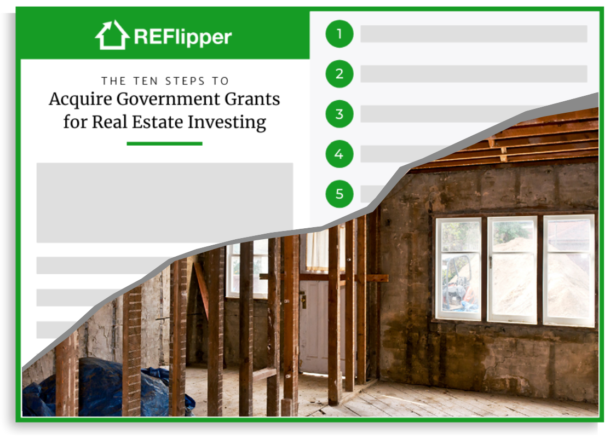People in the fix-and-flip business often find themselves in a fix when it comes to finding money for house flipping.
As portrayed by most TV reality shows, house flippers buy cheap property, remodel it, and then sell it for top dollar.
While it’s indeed true, these shows tend to not show what happens between the purchase of a property and its sale.
Here’s the truth: you’re likely to own the property for months and sometimes even years before you’re able to sell it for a good return.
And during this time, the costs of insurance, repair, taxes, utilities, and more all fall on your shoulders.
Considering this, it’s natural to get confused when you don’t have a pile of cash saved up for a house flipping project. The answer, however, is often quite simple.
Fix-and-Flip Loans
A fix-and-flip loan might just be what you need to get enough capital to rehab your project and bridge the time until you can sell it and make a profit.
While fix-and-flip loans come with varying terms, they are usually short-term — typically repaid within 3, 6 or 12 months.
Selling the house before the loan repayment date and paying the loan off using the proceeds of the sale is the goal here.
What Fix & Flip Lenders Look for
Before you apply for a fix-and-flip loan, you should keep a few things in mind to ensure you get approved.
The first thing that most lenders look for is your financial stake in the property.
Secondly, you need a detailed estimate of renovation costs. Without this, a lender may not take you or your project seriously.
Lastly, lenders will be interested in knowing your financial track record.
Previous house flipping experience will help. But if you’re a beginner, you’ll have to prove your credibility with a decent credit history along with a steady flow of income.
Sometimes, lenders require a personal guarantee, which you may give by offering a personal asset to serve as collateral against the loan.
That being said, lenders are typically only willing to finance around 65% or 70% of the After Repair Value (ARV) of the property or 85% of the purchase cost.
You’ll have to pitch in the rest of the cash on your own, or get it from an equity investor.
It may be possible to find a lender who may be willing to offer 100% financing for the project. However, such a loan is likely to come with an exceptionally high interest rate and could actually be illegal under usury laws.
5 Kinds of Fix-and-flip Loans
There are 5 types of loans that you may use to fund your house flipping project. Each loan comes with its own specific terms, qualification requirements, and a set of pros and cons.
Let’s discuss each option in detail and find out which one is the best bet for you.
1. Hard Money Loans

Also known as ‘rehab loans’, hard money loans are a common choice to fund a house flipping project. Hard money lenders differ from conventional bank lenders such that private lenders fund them. You may get yourself a hard money loan from a private investor, a group of investors, or loan broker.
The terms of these loans are usually much shorter than that of traditional loans. Generally, they offer a six-month to a one-year term but they may go up to five years. They come with relatively higher interest rates, typically ranging from 12% to 21%. You may also be charged 3 to 6 points upfront, where one point denotes 1% of the loan.
As mentioned above, hard money lenders will typically lend up to about 60 to 75 percent of the after-repair property value (ARV). So you’ll have to come up with cash to cover the rest.
On the bright side, hard money lenders usually don’t focus too much on your credit history. People with a credit score as low as 550 can easily qualify for these loans.
Furthermore, there is no extensive paperwork involved in acquiring a hard money loan. The application process is short and fast, which means you can get your hands on the money within a few days.
Another thing to keep in mind is that you present the property that you intend to flip as collateral for the hard money loan. This alleviates the need for a personal guarantee, which substantially mitigates your risk should things go bad.
You can find an extensive list of hard money lenders by state here >
2. Home Equity Loan or Line of Credit
When finding money for house flipping, you should consider getting a home equity loan or home equity line of credit if you have equity in your residential property.
Both these options allow you to use a certain percentage of your home equity as collateral. The only difference is that a home equity loan, like your first mortgage, offers the money upfront and requires you to pay monthly installments over the course of the loan term.
One benefit is a home equity line of credit allows you to use the loan amount in small chunks over the course of the loan life.
For funding a house flip, a home equity loan may be a better option to fund your project considering the ease of access to the money.
Home equity loans offer a fixed interest rate that can be substantially lower than what hard money loans or credit cards offer. Typically, mortgage lenders may allow you to borrow your home equity up to 80% on a second mortgage.
3. Cash-out Refinance
With a significant increase in the value of your current residential property, you can benefit from a funding option called cash-out refinance. The idea is to refinance your mortgage for an amount higher than what you currently owe and tap on the equity in your home, taking away the difference in cash.
As evident by the name, this funding option involves cashing out a certain percentage of your home equity to pay for your house flipping project. This implies that your new loan will be the due payment on your mortgage plus the amount of capital you want to cash out.
As far as the qualifying requirements for cash-out refinance option are concerned, you’ll probably need a minimum of 640 credit score. In addition to this, your debt-to-income ratio should be no more than 45% while your equity in the property should be at least 30% to 40%.
One downside is that cash-out refinance loans require you to pay closing costs, which may take 3% to 6% of the total loan amount. Furthermore, if you’re thinking of refinancing to a higher mortgage rate, you should be prepared to pay a fat interest rate on your loan in the long run.
4. Investment Line of Credit

This is yet another popular option for you to consider when you’re finding money for house flipping.
An investment line of credit is very similar to a home equity line of credit except that it is exclusively intended for purchasing investment properties.
These short-term loans usually offer a term of 18-24 months. You’re given the liberty to borrow money whenever needed until you reach a pre-determined loan limit.
If you have some experience of flipping houses, this option may be ideal for you because your approval will depend on your track record of flipping properties and the financial capital involved. Moreover, an investment line of credit may be received within three weeks with an amount ranging from $1 million to $50 million. The interest rates on these loans are usually from 5% to 8%.
5. Crowdfunding
Another funding source for house flippers is crowdfunding. This option involves raising the required amount of funds through a large number of people using the internet. There are several crowdfunding sites available for you to choose from. Different sites offer different loan terms, interest rates, and qualification requirements.
If you’re finding money for house flipping, you should consider researching the lenders carefully before you apply for a loan. This will help you find an option that is best suited for your needs and wants.
Learn More…
Learn more about finding house flipping investment groups >
Don’t know what getting a second mortgage is? Find out everything here.
If you’re looking into crowdfunding but don’t know where to start, this list of popular crowdfunding sites will help you.
Your lender may ask for a personal guarantee before allowing you to borrow money. Learn everything about it here.


